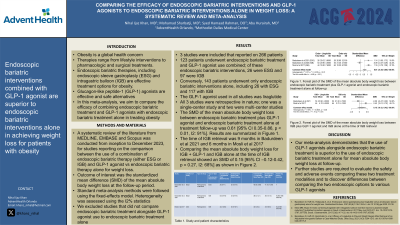Monday Poster Session
Category: Obesity
P3159 - Comparing the Efficacy of Endoscopic Bariatric Interventions and GLP-1 Agonists to Endoscopic Bariatric Interventions Alone in Weight Loss; A Systematic Review and Meta-analysis
Monday, October 28, 2024
10:30 AM - 4:00 PM ET
Location: Exhibit Hall E

Has Audio

Nihal Ijaz I. Khan, MD
AdventHealth Medical Group, AdventHealth
Orlando, FL
Presenting Author(s)
Nihal I. Khan, MD1, Mohamad Sharbatji, MD1, Syed Hamaad Rahman, DO2, Abu Hurairah, MD1
1AdventHealth Medical Group, AdventHealth, Orlando, FL; 2Methodist Dallas Medical Center, Irving, TX
Introduction: Obesity is a global health concern with therapies ranging from lifestyle interventions to pharmacologic and surgical treatments. Endoscopic bariatric therapies, including endoscopic sleeve gastroplasty (ESG) and intragastric balloon (IGB) are effective treatment options for obesity. Likewise, pharmacologic therapies such as glucagon-like peptide-1 (GLP-1) agonists have also been shown to be effective and safe alternatives. In this meta-analysis, we aim to compare the efficacy of combining endoscopic bariatric treatment and GLP-1 agonists with endoscopic bariatric treatment alone in treating obesity.
Methods: A systematic review of the literature from MEDLINE, EMBASE and Scopus was conducted from inception to December 2023, for studies reporting on the comparison between the use of a combination of endoscopic bariatric therapy (either ESG or IGB) and GLP-1 agonist vs endoscopic bariatric therapy alone for weight loss. Outcome of interest was the standardized mean difference (SMD) of the mean absolute body weight loss at the follow-up period. Standard meta-analysis methods were followed using the fixed-effects model. Heterogeneity was assessed using the I2% statistics.
Results: Three studies were included that reported on 266 patients. 123 patients underwent endoscopic bariatric treatment and GLP-1 agonist use combined; of these endoscopic bariatric interventions, 26 were ESG and 97 were IGB. Conversely, 143 patients underwent only endoscopic bariatric interventions alone, including 26 with ESG and 117 with IGB. In all studies, the GLP-1 agonist in use was liraglutide. All three studies were retrospective; one was a single-center study and two were multi-center studies. We excluded studies that did not compare endoscopic bariatric treatment alongside GLP-1 agonist use to endoscopic bariatric treatment alone.
The SMD of the mean absolute body weight loss between endoscopic bariatric treatment plus GLP-1 agonist and endoscopic bariatric treatment alone at treatment follow-up was 0.61 [95% CI 0.35-0.86, p < 0.01, I2: 91%]. Results are summarized in Figure 1.
Discussion: Our meta-analysis demonstrates that the use of GLP-1 agonists alongside endoscopic bariatric treatment is superior to the use of endoscopic bariatric treatment alone for mean absolute body weight loss at follow-up. Further studies are required to evaluate the safety and adverse events comparing these two treatment modalities and to discover differences between comparing the two endoscopic options to various GLP-1 agonists.

Disclosures:
Nihal I. Khan, MD1, Mohamad Sharbatji, MD1, Syed Hamaad Rahman, DO2, Abu Hurairah, MD1. P3159 - Comparing the Efficacy of Endoscopic Bariatric Interventions and GLP-1 Agonists to Endoscopic Bariatric Interventions Alone in Weight Loss; A Systematic Review and Meta-analysis, ACG 2024 Annual Scientific Meeting Abstracts. Philadelphia, PA: American College of Gastroenterology.
1AdventHealth Medical Group, AdventHealth, Orlando, FL; 2Methodist Dallas Medical Center, Irving, TX
Introduction: Obesity is a global health concern with therapies ranging from lifestyle interventions to pharmacologic and surgical treatments. Endoscopic bariatric therapies, including endoscopic sleeve gastroplasty (ESG) and intragastric balloon (IGB) are effective treatment options for obesity. Likewise, pharmacologic therapies such as glucagon-like peptide-1 (GLP-1) agonists have also been shown to be effective and safe alternatives. In this meta-analysis, we aim to compare the efficacy of combining endoscopic bariatric treatment and GLP-1 agonists with endoscopic bariatric treatment alone in treating obesity.
Methods: A systematic review of the literature from MEDLINE, EMBASE and Scopus was conducted from inception to December 2023, for studies reporting on the comparison between the use of a combination of endoscopic bariatric therapy (either ESG or IGB) and GLP-1 agonist vs endoscopic bariatric therapy alone for weight loss. Outcome of interest was the standardized mean difference (SMD) of the mean absolute body weight loss at the follow-up period. Standard meta-analysis methods were followed using the fixed-effects model. Heterogeneity was assessed using the I2% statistics.
Results: Three studies were included that reported on 266 patients. 123 patients underwent endoscopic bariatric treatment and GLP-1 agonist use combined; of these endoscopic bariatric interventions, 26 were ESG and 97 were IGB. Conversely, 143 patients underwent only endoscopic bariatric interventions alone, including 26 with ESG and 117 with IGB. In all studies, the GLP-1 agonist in use was liraglutide. All three studies were retrospective; one was a single-center study and two were multi-center studies. We excluded studies that did not compare endoscopic bariatric treatment alongside GLP-1 agonist use to endoscopic bariatric treatment alone.
The SMD of the mean absolute body weight loss between endoscopic bariatric treatment plus GLP-1 agonist and endoscopic bariatric treatment alone at treatment follow-up was 0.61 [95% CI 0.35-0.86, p < 0.01, I2: 91%]. Results are summarized in Figure 1.
Discussion: Our meta-analysis demonstrates that the use of GLP-1 agonists alongside endoscopic bariatric treatment is superior to the use of endoscopic bariatric treatment alone for mean absolute body weight loss at follow-up. Further studies are required to evaluate the safety and adverse events comparing these two treatment modalities and to discover differences between comparing the two endoscopic options to various GLP-1 agonists.

Figure: Figure 1. Forest plot of the SMD of the mean absolute body weight loss between endoscopic bariatric treatment plus GLP-1 agonist and endoscopic bariatric treatment alone at follow-up
Disclosures:
Nihal Khan indicated no relevant financial relationships.
Mohamad Sharbatji indicated no relevant financial relationships.
Syed Hamaad Rahman indicated no relevant financial relationships.
Abu Hurairah indicated no relevant financial relationships.
Nihal I. Khan, MD1, Mohamad Sharbatji, MD1, Syed Hamaad Rahman, DO2, Abu Hurairah, MD1. P3159 - Comparing the Efficacy of Endoscopic Bariatric Interventions and GLP-1 Agonists to Endoscopic Bariatric Interventions Alone in Weight Loss; A Systematic Review and Meta-analysis, ACG 2024 Annual Scientific Meeting Abstracts. Philadelphia, PA: American College of Gastroenterology.
